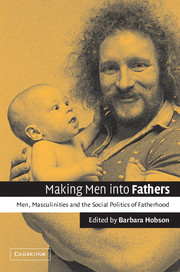Book contents
- Frontmatter
- Contents
- List of figures
- List of tables
- Preface
- Introduction: making men into fathers
- Part 1 Who fathers?
- Part 2 Men in social policy and the logics of cash and care
- 2 Citizens, workers or fathers? Men in the history of US social policy
- 3 Compulsory fatherhood: the coding of fatherhood in the Swedish welfare state
- 4 The problem of fathers: policy and behavior in Britain
- 5 A new role for fathers? The German case
- 6 Transformations of fatherhood: the Netherlands
- Part 3 Resisting and reclaiming fatherhood
- Part 4 Theorizing men, masculinities and fatherhood
- Notes
- References
- Index
5 - A new role for fathers? The German case
Published online by Cambridge University Press: 22 September 2009
- Frontmatter
- Contents
- List of figures
- List of tables
- Preface
- Introduction: making men into fathers
- Part 1 Who fathers?
- Part 2 Men in social policy and the logics of cash and care
- 2 Citizens, workers or fathers? Men in the history of US social policy
- 3 Compulsory fatherhood: the coding of fatherhood in the Swedish welfare state
- 4 The problem of fathers: policy and behavior in Britain
- 5 A new role for fathers? The German case
- 6 Transformations of fatherhood: the Netherlands
- Part 3 Resisting and reclaiming fatherhood
- Part 4 Theorizing men, masculinities and fatherhood
- Notes
- References
- Index
Summary
Fatherhood and fathers are imprinted in the German landscape, in the collective memory of the Nazi past. Yet there has been remarkably little discussion of contemporary fatherhood or fathering, or debates concerning new roles for fathers. Divorce rates in East and West Germany have steadily increased, nearing those of other Western European countries. German divorced fathers, too, often lose contact with their children or do not fulfill their financial obligations. However, one does not find the same moral discourse on absent fatherhood as in the United States or Britain (Curran and Abrams 2000; Orloff and Monson in this volume). Instead, public attention has focused on low birth-rates, costs of living and, recently, the poverty risks of lone mothers and their children (Ostner 1997). The parental leave and the custody law reforms directly concern fathers and fatherhood. Yet they are not framed in terms of fathers' interests, but in terms of labor market needs and the best interests of children.
To understand why there has been so little debate about how to transform men into “responsible dads” in both Germanys, one has to turn back to the legacies of fatherhood from Nazism. But to fully grasp the impediments in the search for a new role for German fathers, one cannot ignore the unification of two countries with radically different social politics of fatherhood.
- Type
- Chapter
- Information
- Making Men into FathersMen, Masculinities and the Social Politics of Fatherhood, pp. 150 - 167Publisher: Cambridge University PressPrint publication year: 2002
- 6
- Cited by



